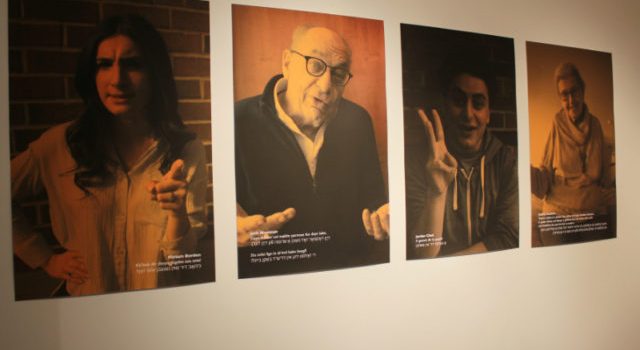Spring’s arrival brings the sounds of Yiddish to Toronto
The early April opening of an exhibit at the Canadian Language Museum kicked off Yiddish Spring, a celebration featuring Yiddish-based concerts and programming at locations around Toronto, in April, May and June.
The opening attracted an overflow crowd who listened to Berlin-based musician Paul Brody’s sometimes humorous sound installation, The Music of Yiddish Blessings and Curses. On the visual side, the exhibit includes a reimagining of doctoral student Miriam Borden’s Komets-Alef-O! Back to School at the Yiddish Kheyder. It was installed at the University of Toronto’s Robart’s Library last year.
To create The Music of Yiddish Blessings and Curses, Brody asked several Toronto Yiddish speakers about their favourite Yiddish curses and blessings, and to speak about the stories and memories behind them.
“Each blessing, each curse was like a little door into that person’s recollection of their lives, of their family and often their relationship with Jewish culture or Yiddish culture,” Brody said during his presentation.
While working on the installation, he discovered the emotion in their voices revealed the musicality of the Yiddish language.
“There’s a lot of narrative to be discovered in the melody of our voice. Your voice, each and every morning when you’re talking about what you want for breakfast, has as much melody in it as any opera aria,” Brody said.
“Our voice melody contains information about a person, their mood and their age, where the person has been, maybe the languages they speak.”
For the installation, he blended the documentary component with musical interpretations of the voice melodies. At the opening, local musicians Lorie Wolf on percussion and Brian Katz on guitar with Paul Brody on trumpet, improvised some musical interpretations based on the voice melodies of curses shared by audience members.

Borden’s Komets-Alef-O! Back to School at the Yiddish Kheyder at the Robart’s Library invited visitors to imagine themselves as pupils learning at a Yiddish kheyder, (heder) where they could explore some of the basic skills required to engage with Yiddish: how to read it, how to write it, how to speak it, and how to identify what it looks and sounds like.
The reimagined exhibit is more of a heder in an experiential sense, with a classroom space, a library space and a home economics space with the Jewish kitchen on display. After viewing the exhibit’s panels, presented as four Yiddish lessons, you can get a worksheet from the reception desk with activities that challenge you to apply your new Yiddish skills.
“There never existed a formal, institutional framework for learning or teaching Yiddish in the Ashkenazic world,” Borden said. “This Yiddish heder is a creation for this space and this time, inviting visitors to reflect on the fact that increasingly 21st-century Yiddish spaces have moved from the street, the home and the shul into the classroom, the library and, yes, the museum.”

Photographs by Rowan Van Blerk, expressive portraits of people Brody interviewed for the sound installation, line the gallery’s walls. You can listen to the sound installation through headphones the gallery provides.
A project of the Ashkenaz Foundation in association with the UJA Committee for Yiddish and several independent partners, Yiddish Spring is also made possible in part with the support of UJA’s Kultura Collective.
Highlights of Yiddish Spring:
• The Yiddish Spring exhibit runs until June 27 at the Canadian Language Museum, Glendon College, 2275 Bayview Ave. (languagemuseum.ca)
• April 24, June 5, 12, 19, 26; Toronto Klezmer Society jam sessions at Drom Taberna, 458 Queen St. W., 9 p.m. to midnight,
• May 19, World Fiddle Day: Spotlight on Klezmer, with guest artists Deborah Strauss and Jeff Warschauer, at the Canadian Language Museum, 10 a.m. to 6 p.m.
• May 30, Daniel Kahn and the Painted Bird, radical Yiddish borderland bandidas with punk attitude. Presented by Ashkenaz and UJA Committee For Yiddish as part of Jewish Music Week at the Lula Lounge, 8 p.m.
• June 18, lecture by University of Toronto professor Anna Shternshis about Yiddish Glory – Lost and Found: Yiddish Songs of Soviet Jews During World War 2, Schwartz/Reisman Centre, 9600 Bathurst St., 1 p.m.
For tickets, visit ashkenaz.ca.

